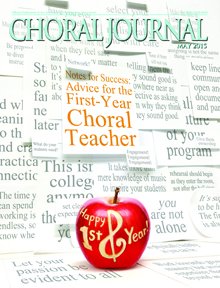In May, August, and September 2015, the Choral Journal featured a three-part article series titled “Notes for Success: Advice for the First-Year Choral Teacher.” As part of the series, 11 choral conductors with teaching experience ranging from 4 to 34 years answered 10 questions related to setting expectations for your first year, classroom management, balancing a successful work and home life, finding repertoire, and more.
In this column, I would like to address question #3: How do I best balance my personal life and the stress of my job? How do I balance the role of educator and musician?
A portion of the suggestions listed in the May 2015 issue regarding this question follow. Please leave a comment below with a strategy that has worked for you (or perhaps one that hasn’t!) so that we can continue to learn from one another.
“Balancing the personal life and the professional life has been the hardest part of my career. I think having children makes it even more complicated. Every day when I wake up, I make a choice, and it is not about having it all… I think it is important as choral directors that we continue to hone our craft. For about an eight-year span, I stopped singing. I told myself it was because I was too busy with family. I was singing at work with my students, and that was enough. I was wrong… Last year I started singing again with a local auditioned group. Suddenly, I remember why I go to work every day. What we do is so important; we are feeding our students through music. Do not forget to feed yourself.”
“Effectively balancing the dual role of educator and musician depends largely on recognizing each as dependent upon and inseparable from the other. I tell my college students they are essentially earning a “double major” in both music and education… A helpful reminder to my continual development as a teacher and a musician is to think about what a mentor conductor would identify as prominent strengths in my choral classroom.”
“Find one way to continue making music where you are not in charge that fulfills your need to be creative. You are worthy of care! Because you are worthy of care, learn to employ the “noble no” when a request won’t fit into your school and life schedule. People will learn to respect your forethought and follow-through when you only take on what you can manage.”
“Music teachers have to think about so much all the time: lesson plans for the next day, repertoire selections for next week, field trip logistics for next month, course selections for next year. There will never be a time when everything is completed. The sooner you can be comfortable with this, the easier it will be to take some much needed personal time for yourself.”
See also: question #6: How do I best establish a grading strategy? Read it here.
Click here to read the full article that contains the rest of these answers in Part 1 of this series.
Click here to read Part 2. Click for Part 3. (Must be logged in to acda.org as a member)

+(1).gif)

Two sentences in the last paragraph —- “There will never be a time when everything is completed. The sooner you can be comfortable with this the easier it will be…” —- reminded me of a professor’s advice in my M.Ed. program. He took it a step farther and advised, “You can’t do it all, so make a conscious decision about what you are NOT going to get to.”
I love this article. I was blessed to sing with the Cleveland Orchestra Chorus during my teaching career. The COC professional level chorister demands were translated to my students within their ability level. Yes, keep performing yourself to realize both sides of the baton. I’d also remind new teachers to keep personal ego under control. Applause is contagious, but remember the recognition is on your students, don’t let it go to your head. Your family time passes quickly. In retirement, I’m blessed to be involved with my five grandchildren who are beginning to explore music in a variety of forms. I’m an Uber grandpa for their extra rehearsal needs. I don’t want to cheat them in the way I often felt I cheated my son and daughter on family time because of my music schedule. In retrospect, family is more important than career. Try to do both well.